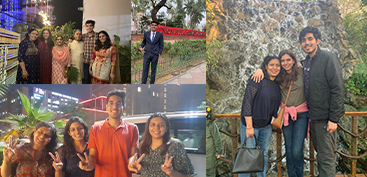A student of Panjab University, Sukhman Singh, who has earned the sobriquet of the ‘bloodman of Chandigarh’, has been making remarkable contribution in saving lives by arranging blood and platelet donors for patients in need. His journey began in 2015 when he enrolled at Panjab University. Sukhman Singh was deeply moved by the plight of families desperately searching for blood for their loved ones. Witnessing their struggles ignited a strong desire within him to initiate a meaningful change and serve his community.
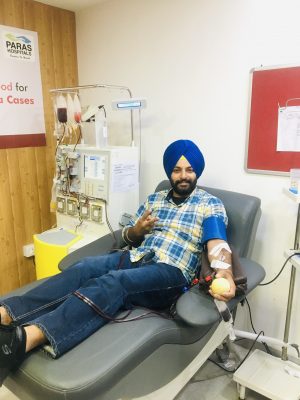
24-yr-old Sukhman Singh holds a master’s degree in social work from Panjab University and is currently pursuing a master’s degree in Political Science. In an interview with CityWoofer, he candidly shared his journey, shedding light on his motivations and accomplishments.
How did your tryst with blood donations begin?
I always reflect on that fateful day when a desperate mother’s plea for her son’s life changed everything. It was outside the PGI Chandigarh where her heartfelt request for blood donation reached my ears. Without hesitation, I stepped forward, offering what I could—a chance to save another person’s life. Little did I know that this one act would unknowingly ignite a fire within me shaping the course of my life.
Over the past five years, I have dedicated myself to the cause of saving lives. Going through the pain of accidents and surgeries of others, I have witnessed the transformative power of a simple act—donating blood and platelets.
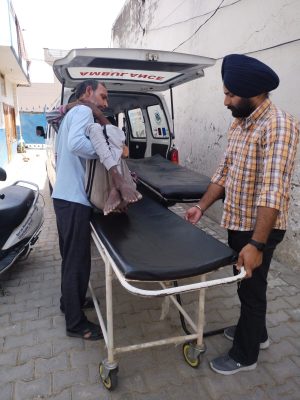
How do you gather blood donors whenever there is an emergency?
Through the collaboration of donors within the university’s departments and hostels, we respond promptly to inquiries by sharing requirements on social media and personally contacting potential donors. Together, we have formed a formidable group, united by our shared commitment to help those in need. More than 15 girls have become an integral part of the blood donor list, and our collective efforts have garnered the support of over three thousand blood donors.
How will a person in requirement of blood reach out to you?
I have provided my contact number to every staff member in the emergency wards, ensuring that individuals can reach out to me directly whenever needed. Rest assured, we make every effort to offer timely assistance in critical situations. We only deal in emergency cases.
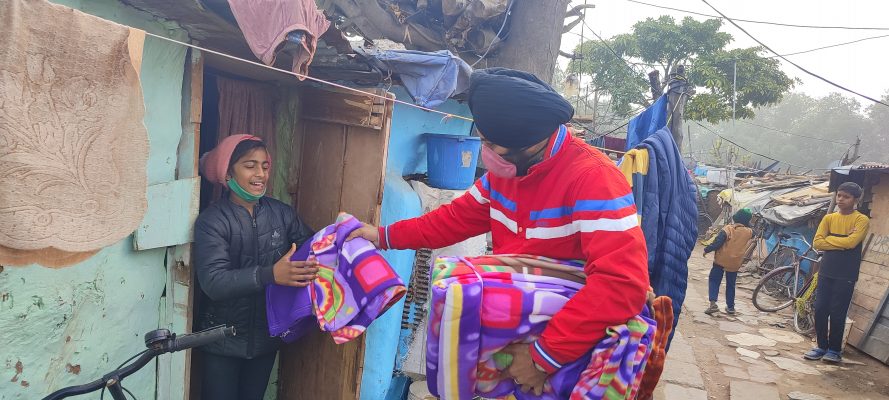
Are you getting any help from NGOs and local bodies?
We are receiving no government support. I single-handedly manage this initiative with the assistance of a local student network at Panjab University. Panjab University has played a vital role in supporting and facilitating our efforts.
What are the other initiatives run by you?
As part of our regular initiatives, we organize chai langars (tea stalls) outside PGI and extend financial assistance and donations to families of patients facing dire circumstances.
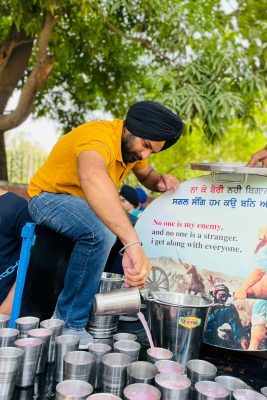
The process of blood and platelets donation
Eligibility Check: Donors undergo a screening process to determine their eligibility. This typically includes age, weight, and health-related criteria. Donors may be asked questions about their medical history, recent travel, and certain lifestyle factors.
Registration: Donors provide their personal information and complete necessary forms, including consent and health questionnaires.
Medical Check-up: A medical professional conducts a brief examination to ensure the donor’s health meets the requirement of blood donation. This may involve checking vital signs such as blood pressure, pulse, and haemoglobin levels.
Donation: For blood donation, a sterile needle is inserted into a vein in the donor’s arm. Typically, around 1 pint (approximately 470 ml) of blood is collected. The process takes about 8-10 minutes. Platelet donation involves apheresis, a process where blood is drawn from one arm, platelets are separated, and the remaining blood components are returned to the donor’s other arm. This process can take longer, usually around 1-2 hours.
Post-Donation Care: Donors are given instructions on how to take care of themselves after donation, such as staying hydrated and avoiding strenuous activities for a few hours. They are also informed about potential side effects and provided with contact information for any concerns or complications.
Contact: 9357999949
(The writer, Shweta Yadav, is an independent writer and researcher, passionate about uncovering untold narratives)









